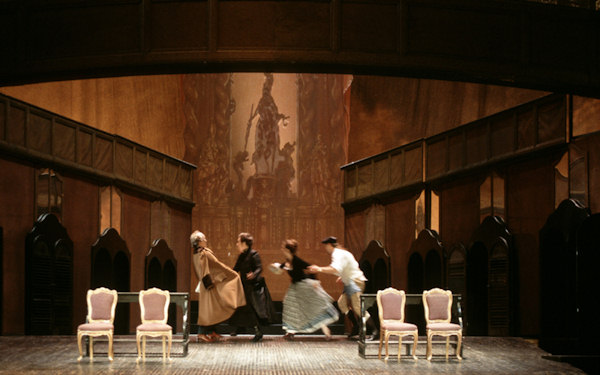Other Links
Editorial Board
-
Editor - Bill Kenny
Assistant Webmaster - Stan Metzger - Founder - Len Mullenger
Google Site Search
SEEN AND HEARD INTERNATIONAL OPERA REVIEW
Mozart, Le Nozze di Figaro: Soloists, Staatskapelle Berlin. Staatsopernchor. Conductor: Frank Beermann. Deutsche Staatsoper Unter den Linden Berlin. 11.2.2010 (JMI)
Production: Deutsche Staatsoper Berlin.
Direction: Thomas Langhoff.
Sets: Herbert Kapplmüller.
Costumes: Yoshi’o Yabara.
Lighting: Franz Peter David.
Cast:
Figaro: Alexander Vinogradov.
Susanna: Sylvia Schwartz.
Count Almaviva: Arttu Kataja.
Countess Almaviva: Anna Samuil.
Cherubino: Rachel Frenkel.
Marcellina: Stephanie Weiss.
Bartolo: Andreas Bauer.
Basilio: Florian Hoffmann.
Barbarina: Rinnat Moriah.
Antonio: Bernd Zettisch.
Don Curzio: Paul O’Neill.

Production Picture © Monika Rittershaus
While attending this performance of Le Nozze di Figaro I could not help thinking about how easy Mozart's music seems when we hear it and how difficult it
actually is to play and sing. For many years I have been convinced that nothing tests a singer’s capabilities more than Mozart, since the music reveals everything,
both strengths and the weaknesses, mercilessly and immediately. Obviously enough, these ideas come most clearly to mind when I am not especially
enjoying a performance.
Staatsoper Unter den Linden’s Le Nozze is yet another revival of Thomas Langhoff’s production, premiered in May 1999 and performed over 60 times to date. The production has aged considerably and
nowadays offers very little of interest that has not been seen here and elsewhere many times before. It is both traditional and classical and two very important aspects are missing from the staging – specifically colour and luminosity, both of which are hard to find here. The sets are orthodox, the costumes are not very colourful, except for the Countess, and the lighting is not particularly interesting. The best moments are in the Garden scene, but generally speaking Mr. Langhoff’s direction is little more than competently routine.
Musical direction was in the hands of Frank Beermann, who delivered an effective reading, although generally
a little short on lightness and grace. In fact, the opera did not begin to fly until the end of Act II and Mr. Beermann used the traditional cuts in the last act
too. I was somewhat disappointed with the Staatskapelle Berlin, although much of this might have been due to fatigue since the players were just back from a concert tour to Paris.
Figaro was sung by Alexander Vinogradov, whose performance was a long way from Mozart's intentions, to say the least. It is one thing is to produce the right notes and something very different indeed to sing the role persuasively. Mr. Vinogradov gave us all the notes sure enough, but there were no nuances or subtleties to most of them:
he sang uniformly forte in fact, resulting in a monotonous and frankly boring performance.
Susanna was performed by the Spanish soprano Sylvia Schwartz, whom I found too much the soubrette for the role. Susanna’s music is very much in the middle of the voice and a different kind of voice to Ms Schwartz’s is needed for it. She was inaudible in some of the recitatives and while she is a good actress, and an excellent singer as she proved by her aria of the last act, I did not find her voice
particularly well - suited to this role.
Arttu Kataja, another good actor with a good figure for the role, was a Count Almaviva short on vocal projection, with a smallish and rather recessed voice. This is not really
sufficient for the Count and his aria revealed serious shortcomings at the top of his range. Similarly, the Russian soprano Anna Samuil seemed miscast as the Countess, although she too looks good on stage and acts well. She was disappointing in “Porgi amor”, but improved for “Dove Sono”.
Possibly the best cast singer was Cherubino, played by the youngster Rachel Frenkel, from the Staatsoper training school. She has a very pleasant voice and is quite an expressive singer. She was very good in "Non so più"
but not quite so impressive in "Voi che sapete". Even so, should have a good future ahead of her.
Some of the supporting roles were generally fairly nondescript vocally. Stephanie Weiss was better actress than singer as Marcellina, Andreas Bauer was a somewhat coarse Bartolo. Florian Hoffmann did a good job as Basilio, Rinnat Moriah, another member of the training school, offered a good Barbarina,
while Bernd Zettisch was an acceptable Antonio and I particularly liked the voice of Paul O'Neill as Don Curzio.
The theatre had an almost full house, with a large number of young people present which was pleasing to see. The audience seemed to enjoy the show and there was warm applause after each aria. At the final bows the best receptions went to Vinogradov, Schwartz and Rachel Frenkel.
José M Irurzun
